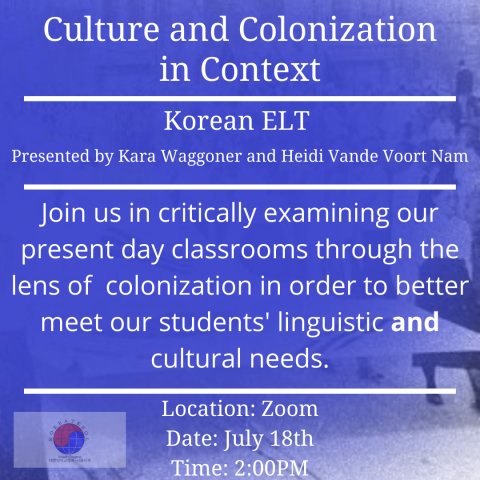
Join us on July 18th for a very
important workshop! We have a great opportunity to address issues of race and
linguistic ownership in the English language learning classroom at this time
in history. This has long been an important issue, but it is now a crucial time
to learn more about how ELL can be improved in regard to cultural and racial
sensitivity and consideration. In doing so we can make sure that we as
educators don't inaccurately reinforce outdated colonial and imperialistic
ways of thinking that are not only damaging to vulnerable groups but also
set our students up with misinformation. We must consider the cultures of the
world, including the cultural context of our Korean students, when we teach a
language that is considered so critical to international communication. We
look forward to seeing you at the workshop! Let's continue to grow together!
(The Culture and Colonization workshop is limited to 30 participants. This is
on a first-come, first-serve basis so reserve your spot ASAP. If demand is in
excess a supplementary workshop will be held at a later date. Please register
using the google form at the bottom of this page to reserve your spot. Upon
registration you will be sent a confirmation via email which will include
Zoom information for the workshop.)
An introduction from Kara Waggoner:
Culturally Sensitive Language Classrooms in Korea
English first arrived in Korea in 1883 and since WWII has been seen as a gateway for opportunities, such as a higher paying job. English education is a booming business in Korea with as many as 25,000 Native English speaking teachers working in the country alone (International TEFL Academy, 2020). With so many English teachers in Korea it is our academic responsibility to ensure that we are being mindful of our students’ cultural and linguistic needs in our language classroom.
This interactive, reflective presentation will ask participants to examine their own teaching and think about ways they can be sensitive to their Korean students’ language and cultural needs. The presenters will start by asking participants to take a brief quiz, examining their own potential biases they might have in their classrooms when it comes to culture and language use. From there we will examine how languages, Korean especially, have been colonized over time and what that could look like in today’s classroom. The presenters will then discuss how imposing our language beliefs on our students can be detrimental to their learning and self-efficacy. Finally, we will discuss ways in which our classrooms can be culturally sensitive to our students and their needs and why this is so important for everyone.
Throughout this presentation participants will have opportunities to engage and share ideas with each other. The presenters would like the participants to reflect on their past teaching experiences and think about new ways they could implement some new ideas in their teaching as well.
REGISTER BELOW!


